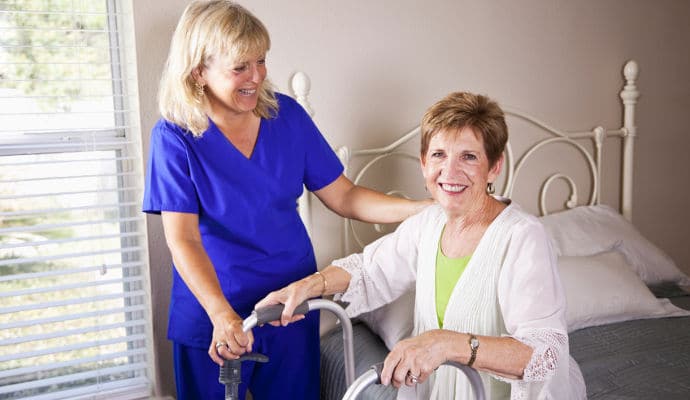Moving to assisted living is a significant change for an older adult. The Senior List shares advice on how to best support a senior parent as they adjust to their life in an assisted living community.
Change is constant; yet accepting and adapting to it isn’t easy. As a result, many of us aren’t open to change. This is especially true for aging seniors moving from the comfort of their homes into an assisted living community.

Most aging seniors aren’t open to this change as they fear isolation and are unsure of what the new environment will bring.
On the other hand, a few seniors take to it from day one and try to adapt to the new environment. They find it thrilling to live in a new community, get socially active, and pursue hobbies.
Either way, the first few days (even months) in the new community can be challenging for your senior parent.
Hence, it’s essential to be around your seniors and offer much-needed encouragement, positive reassurance, and support to help them adjust to the new lifestyle.
Here are some practical tips to ease your senior parent's transition.
Helping An Aging Parent Adjust to Assisted Living
1. Stay in Touch
The fear of isolation is one of the top reasons why seniors are reluctant to move to an assisted living facility.
Don’t let your elderly parent succumb to feelings of isolation and abandonment while in the assisted living facility. Regular visits can assure them of your love and support.
If you live in the same city, visit as frequently as possible. Introduce predictability in your visits. For instance, block your calendar for Saturday each week to spend the day with your senior loved one.
If you have a hectic work schedule, use technology to your advantage. Skype and WhatsApp are practical tools to keep the lines of communication flowing, regardless of where you are.
Be with your senior parent during and after the move-in period to smooth the transition. In fact, stay with them for a few days during the move-in phase to help them settle in.
2. Lend an Empathetic Ear
Moving to an assisted living facility is often accompanied by mixed feelings of abandonment, inadequacy, fear of the unknown, and loss of dignity and independence. It’s natural for your senior to feel distraught and isolated during their first few months at assisted living.
Stay in constant touch with your parent during this initial phase.
Patiently listen to everything they have to share, even if it’s full of negativity. Avoid trivializing the situation by saying things like, ‘It’s just a phase,’ ‘It’s not as bad as you are making it look,’ or ‘You are being negative.’ Instead, hear them out and offer solutions that can help them adjust to their new environment.
Please encourage them to participate in the activities and social events organized by the assisted living facility. Most reputable assisted living facilities offer a range of activities for seniors and also invite volunteers to help with community work.
For instance, several facilities have residents taking up roles, such as managing the library or answering phone calls. Increased social activity will improve their well-being and make them realize that the new life isn’t as bad as it seemed earlier.
At times, take a friend, a former neighbor, or another family member along to lighten the mood and help your elderly parent feel loved.
Aim at keeping the lines of communication flowing. Even if you think your parent is well cared for, it’s critical to be around till they are entirely on board, which, in some cases, takes longer than expected.
Listen! Allow your parent to express their emotions. Giving them time to acclimate to this new lifestyle will go a long way toward helping them achieve greater happiness in the future.
VIDEO: Helping an Aging Adult Adjust to Assisted Living
3. Don’t be Over-Protective
Maintaining senior independence is critical as it promotes a sense of purpose and achievement. This boosts their self-worth and emotional well-being.
That’s exactly the lifestyle that assisted living facilities promote. They offer customized care services while ensuring your senior’s independence and privacy.
Though you may be concerned about your parents’ ability to adjust, avoid overprotecting them.
Offer necessary and reasonable attention and care, but refrain from hand-holding them. Doing so will only increase your seniors’ dependence on you, hindering their ability to adapt to the new environment.
4. Add a Personal Touch to the New Living Space
One sure-shot way to help your aging parent adjust to the new environment is to place familiar items and keepsakes in their assisted living suite or apartment.
For instance, if your parent is accustomed to having a Bible, other books, music CDs, and a family photo at their bedside, do the same in their new living space.
Encourage your senior loved one to share their layout preferences and let them make decisions about their apartment decor.
Get their inputs on the furniture arrangement and the choice of pictures and keepsakes. Involve them in setting up the room, but make sure it’s functional and safe.
Cloning the home environment will help them feel at home in the new environment.
5. Connect With the Staff
The staff at reputable assisted living facilities take great care to make their senior residents feel involved. They often go out of their way to attend to their specific health and entertainment needs.
However, since your ward is still adjusting to their new home, it’s wise to meet the staff and discuss your senior’s care needs. This will ensure that the little things that make your parents’ life comfortable are taken care of.
Whenever you visit the facility, meet the staff to understand how your parent is adjusting. This will help you work with them towards making your senior’s life more comfortable in the facility.
Final Thoughts on Adjusting to Assisted Living
Your parent has always been there for you, in good and rough times alike. Now that they're moving into assisted living, it’s your responsibility to ease their transition.
Without a doubt, the first days at the assisted living community will be challenging. Use the tips shared in this post to help your elderly parent adjust to their new home and live a happy and healthy life.
Recommended for you:
- 7 Senior Housing Options: Which One Works Best?
- How to Choose an Assisted Living Facility: Helpful Checklist and Tips
- How to Pay for Assisted Living: 6 Options
Guest contributor: Amie Clark is the co-founder, former senior editor, and visionary behind The Senior List, and she now brings those skills here to DailyCaring.com. She loves to share her insights on senior living and caregiving, focusing on innovative eldercare products and services that support their well-being. Her background in social work, especially with seniors and their families, has equipped her with the required knowledge and determination to express her thoughts and share best practices with others. She enjoys live music, traveling, and going outdoors with her family.













